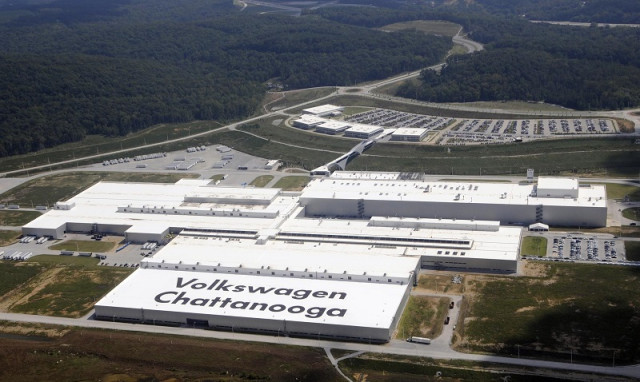

University of Tennessee at Knoxville Study Reports the 2012 Economic Impact of the Chattanooga Plant.
Created 12,400 full-time jobs at Volkswagen, at suppliers and in the economy.Responsible for $643.1 million in annual income.Increase state and local tax revenue by $53.5 million annually.
The UTK study states that of the 12,400 full-time jobs the Chattanooga plant directly employs 2,415 employees and indirectly employs 9,985 employees through the suppliers and other companies where Volkswagen spends its earnings and multiplier effects. The company has attracted 17 supplier companies to the area.
Of the $643.1 million that Volkswagen pays, $159.2 million is paid to direct Volkswagen employees and indirect employed account for $483.9 million in income due to multiplier effects.
The study also reported that all jobs paid directly by Volkswagen Chattanooga earn on average at least $50,000 in 2012, which includes bonus, benefits and overtime.
“The people of Tennessee, Hamilton County and Chattanooga made a commitment to Volkswagen in 2008,” said Frank Fischer, CEO and Chairman of Volkswagen Chattanooga. “I’m pleased that this report shows that our project has been very successful, and the investment has proved to be a wise one,” Fischer said.
The study estimates that the Volkswagen plant increases state and local tax revenues by $53.5 million annually. State revenue tax is estimated to increase $31.2 million, and local revenue tax is expected to increase by $22.3 million.
About Volkswagen Chattanooga
Volkswagen has invested $1 billion in the local economy for the Chattanooga plant. The Chattanooga manufacturing facility builds the all-new 2012 Passat Sedan, specifically designed for the North American market and winner of the Motor Trend magazine 2012 Car of the Year award. In 2012, it produced more than 152,400 Volkswagen Passats, in May 2013 the plant produced the 250,000th car. Volkswagen Chattanooga is the first and still only car factory worldwide with a LEED Platinum certification. It is also certified according to ISO 9001 for its quality management system, according to ISO 14001 for its environmental management system and according to ISO 50001 for its energy management system.
